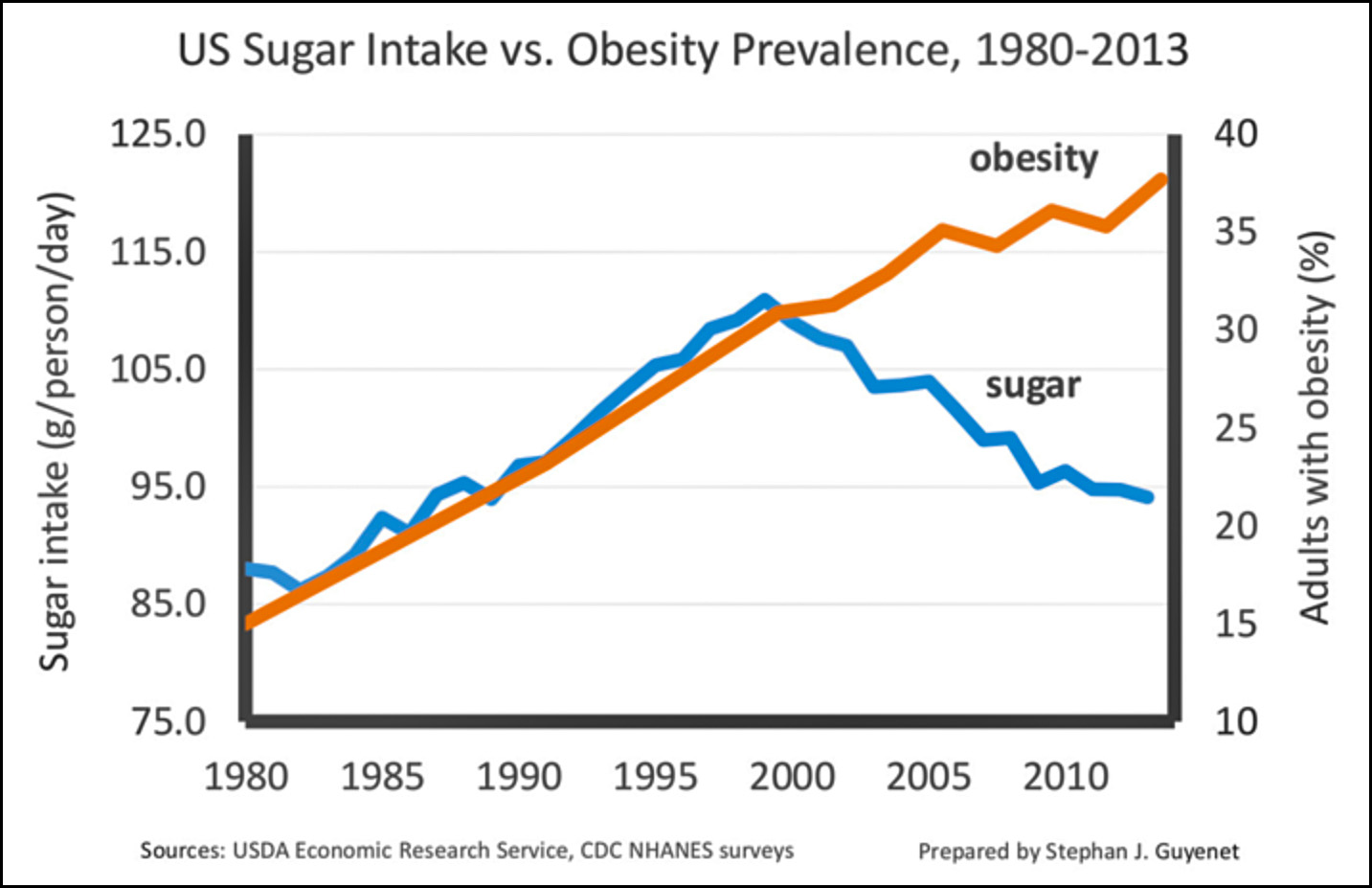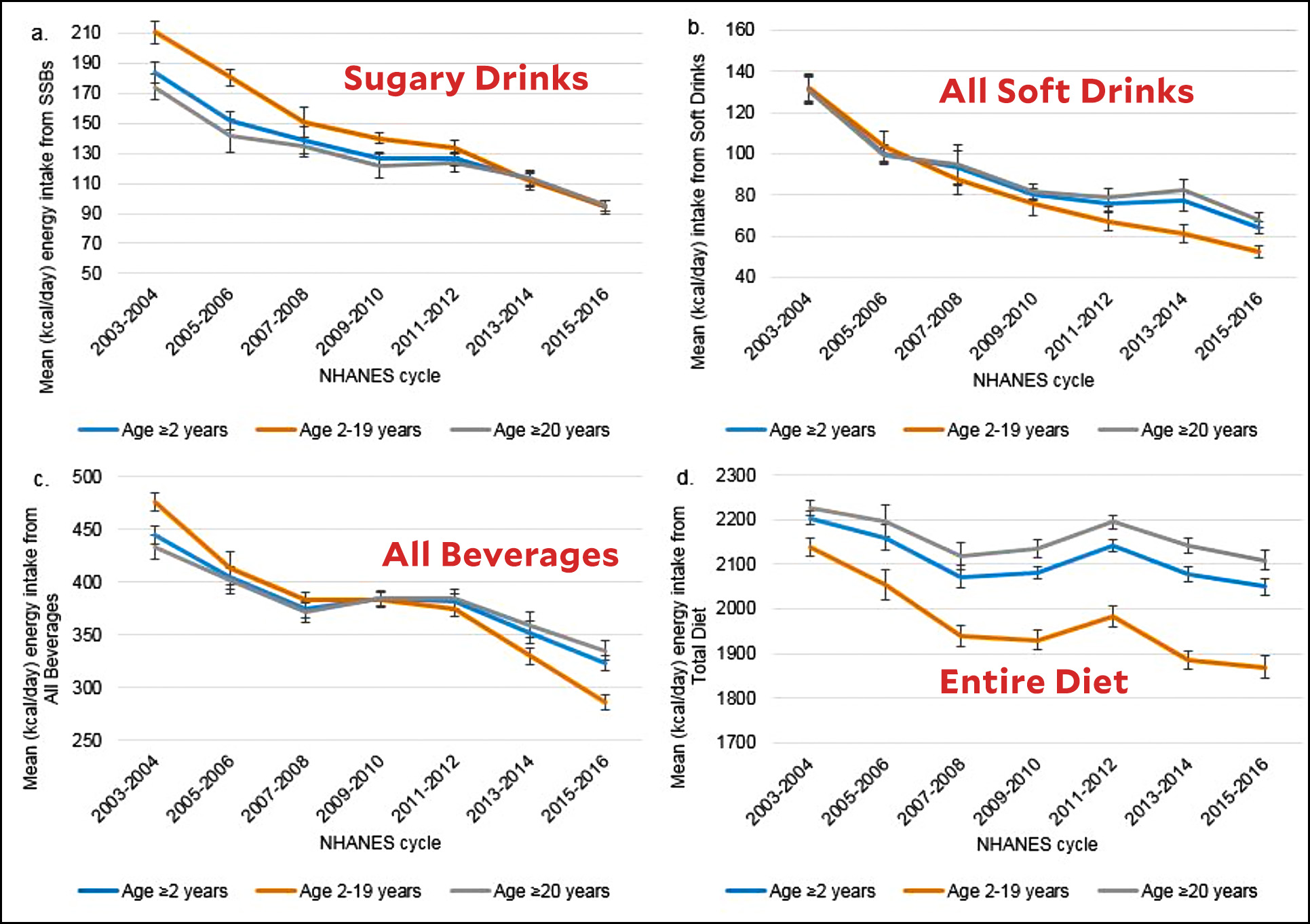On Twitter, a reader suggests I should comment on this chart from Alex Tabarrok:
 Alex says this chart "casts doubt on a sugar mono-causal theory of obesity," which I have no problem with since there are damn few monocausal explanations for anything.
Alex says this chart "casts doubt on a sugar mono-causal theory of obesity," which I have no problem with since there are damn few monocausal explanations for anything.
For what it's worth, the decline in sugar consumption is due almost entirely to the collapse in soda consumption, which has gone down by something like a quarter since the late '90s:
 As a result of this and, presumably, other things, per capita calorie consumption in the US has recently flattened out and even declined a bit. It's still vastly higher than it was 50 years ago, but it's no longer going up.
As a result of this and, presumably, other things, per capita calorie consumption in the US has recently flattened out and even declined a bit. It's still vastly higher than it was 50 years ago, but it's no longer going up.
Beyond that, my personal sense is that our long-term increase in obesity is due mostly to the increased popularity of sugar, vegetable oil, prepared foods, and fast food. This is pretty conventional thinking, and the only unconventional part of it is that I don't think consumption of meat and animal fats has much to do with it, especially since consumption of both has declined over the past century.
But this is all tentative, and I haven't studied it deeply. It's just my two cents.

Again, obesity is an important, if not the most important, comorbidity for COVID and the US is either the fattest or second fattest Western country and we wonder why our death rate is higher.
Now it's antivaxers, but before that it wasn't that we didn't respond or that Trumpers weren't wearings masks so much as it's that we're fat and asthmatic (because of air pollution.)
Cite(s), please.
The population is getting older and older people gain weight? Not talking from experience, mind you.
Well, my anecdotal experience is, when I see a multigenerational group of related women, the oldest are the thinnest, and each successive gen is fatter.
So that last graph shows total caloric intake going down, and yet obesity is rising. That implies that the problem is in caloric expenditure - movement, in general.
I've also seen that people tend to gain weight when stressed, apparently not because they are stress eating, or not necessarily from increased intake.
I agree on this. I've been working from home since March of 2020-- and I replaced commuting time with biking time. I've lost over forty pounds, mainly in the warmer months. To be clear, I have also refined my diet a bit-- I'm no longer in an office where there are people bringing in sweets and occasional pizza lunches. But I suspect the main benefit has been my increased exercise level.
Much research has suggested that artificial sweeteners aren't exactly helpful with obesity -- https://pubmed.ncbi.nlm.nih.gov/29159583/
Multiple issues have been raised about how artificial sweeteners affect your gut biome and your body's regulation of glucose.
Like how partially-hydrogenated fats ended up being worse than butter, so too is artificial sweetener compared to sugar.
I think it's a combination of less strenuous jobs and cheap, calorie-dense food. You read about early 20th century folks, and they weren't exactly eating healthy food either - farmers would eat like 5000 calories a day, pie with more than one meal, tons of stuff cooked in lard, etc. They just had less of it, and were more physically active.
I get fatter every year no matter what.
Unfortunately, average calories consumed don't tell us much. We'd need to break it out by sex/age to get more information based on a comparison to what is maintenance for each group.
If my maintenance calories are 2,200 per day, and I cut back from eating 2,400 calories per day to only eating 2,300 calories per day, I am still going to gain weight because of my calorie surplus. I'll just gain weight more slowly than I did before.
I highly suspect there is something metabolic going on. Many of the food additives and ingredients used today were not widely used even 50 years ago. From Corn Syrup to additives and dyes, very little of it was around pre-1970s.
Physical exertion, actual calorie spend has changed.
Total calories up, average calories burned as a function of more sedentary lifestype. Form of calories is not meaningful (except higher calorie density makes it easier to consume more) as compared to calories consumed versus spent.
A few comments above mentioned that, if people are getting heavier while consuming less calories , then they have to be also burning less calories through by activity .
Yes .
But this does not necessarily mean that as a society we are becoming less active ( although might be true). You have to consider changes in age distribution.
And a significant factor here is the movement of big bumps in age distribution through time, such as the baby boom and baby boom echo . The highest calorie consumption and expenditure should likely be late teens and early 20s. And when the baby boom echo is moving through that age range is exactly when you see the bump in the graph.
Because it's not about sugar, it's about processed foods and overall calorie consumption.
You really do have to break it down by subgroups, as well as by age.
Cutting back on sugar, especially with the young, will help with diabetes, and possibly with obesity. That could take a generation to show up in the numbers.
Other issues will play a role, i.e. access to fruits and vegetables, etc. Though I guessing you could also show a positive correlation with school lunch programs and obesity.